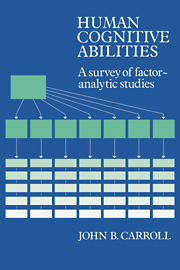Book contents
- Frontmatter
- Contents
- Preface
- PART I INTRODUCTION TO THE SURVEY
- PART II THE IDENTIFICATION AND DESCRIPTION OF COGNITIVE ABILITIES
- Chapter 5 Abilities in the Domain of Language
- Chapter 6 Abilities in the Domain of Reasoning
- Chapter 7 Abilities in the Domain of Memory and Learning
- Chapter 8 Abilities in the Domain of Visual Perception
- Chapter 9 Abilities in the Domain of Auditory Reception
- Chapter 10 Abilities in the Domain of Idea Production
- Chapter 11 Abilities in the Domain of Cognitive Speed
- Chapter 12 Abilities in the Domain of Knowledge and Achievement
- Chapter 13 Psychomotor Abilities
- Chapter 14 Miscellaneous Domains of Ability and Personal Characteristics
- Chapter 15 Higher-Order Factors of Cognitive Ability
- PART III ISSUES
- References and List of Datasets
- Appendix A Codes for Countries, Samples, and Factors
- Appendix B Hierarchical Factor Matrix Files
- Name Index
- Subject Index
Chapter 11 - Abilities in the Domain of Cognitive Speed
Published online by Cambridge University Press: 29 September 2009
- Frontmatter
- Contents
- Preface
- PART I INTRODUCTION TO THE SURVEY
- PART II THE IDENTIFICATION AND DESCRIPTION OF COGNITIVE ABILITIES
- Chapter 5 Abilities in the Domain of Language
- Chapter 6 Abilities in the Domain of Reasoning
- Chapter 7 Abilities in the Domain of Memory and Learning
- Chapter 8 Abilities in the Domain of Visual Perception
- Chapter 9 Abilities in the Domain of Auditory Reception
- Chapter 10 Abilities in the Domain of Idea Production
- Chapter 11 Abilities in the Domain of Cognitive Speed
- Chapter 12 Abilities in the Domain of Knowledge and Achievement
- Chapter 13 Psychomotor Abilities
- Chapter 14 Miscellaneous Domains of Ability and Personal Characteristics
- Chapter 15 Higher-Order Factors of Cognitive Ability
- PART III ISSUES
- References and List of Datasets
- Appendix A Codes for Countries, Samples, and Factors
- Appendix B Hierarchical Factor Matrix Files
- Name Index
- Subject Index
Summary
If speed deserves any weight in determining the measures of intellect it is by virtue of the principle that, “Other things being equal, the more quickly a person produces the correct response, the greater is his intelligence”.
Edward L. Thorndike et al. (1926, p. 24)This chapter is concerned with two major issues:
What dimensions of ability exist in the domain of cognitive speed?
and
How are these abilities related to, or indicative of, cognitive abilities in which speed of performance is involved only minimally, or not at all? Asking this question loosely, how is “speed” related to “intelligence”?
Answering these questions from presently available knowledge requires prior discussion of several terminological and methodological issues. Such terms as “speed,” “power,” and “level” have had varying interpretations and operationalizations that must be carefully observed and distinguished. After reviewing the ways in which these terms have been used and setting forth the definitions that are to be employed in subsequent discussion, I review a number of models that have been proposed for interpreting the rates at which cognitive tasks are performed.
Next, studies of relations among rates of task performance, levels of task mastery, and task difficulty are reviewed. In the course of this review, attention is directed to the relatively few factor-analytic studies that have been specifically addressed to identifying speed-of-performance abilities as distinct from level-of-mastery factors.
- Type
- Chapter
- Information
- Human Cognitive AbilitiesA Survey of Factor-Analytic Studies, pp. 440 - 509Publisher: Cambridge University PressPrint publication year: 1993
- 1
- Cited by



